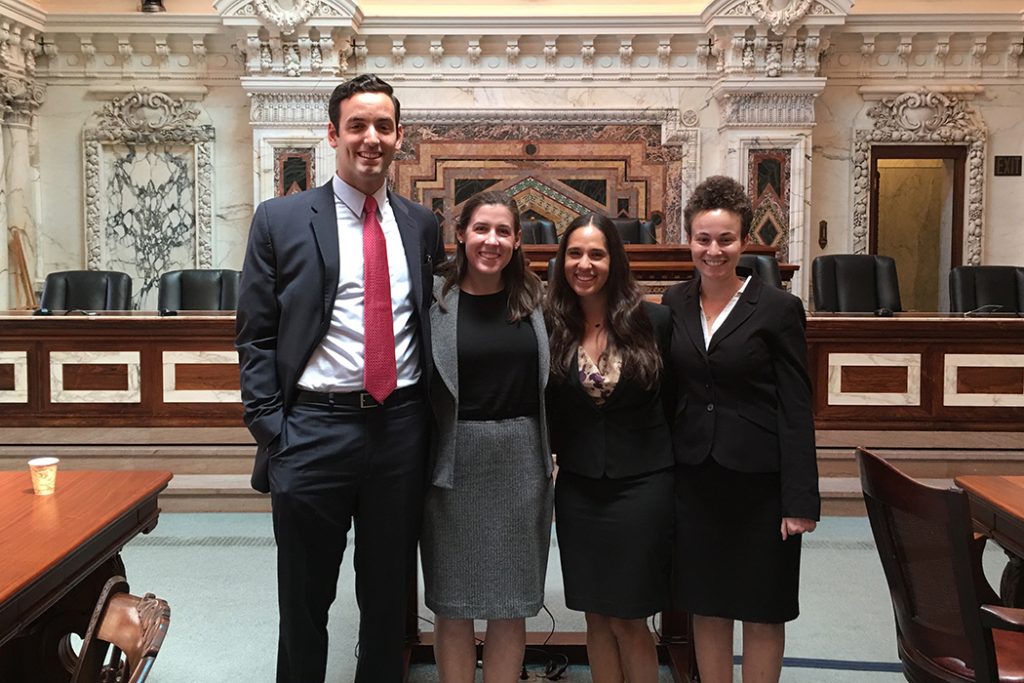Four third-year law students argued before the Ninth Circuit Court of Appeals April 15 on behalf of indigent clients who could not otherwise afford representation. Both cases involved immigrants fighting to remain in the country.
The students are part of BC Law’s Ninth Circuit Court Appellate Program, a clinic founded and directed by Professor Kari Hong. It is the third year of arguments for the new clinic (read an account of last year’s experiences in our BC Law Magazine feature sections here and here, and of the inaugural year here).
“Jovalin Dedaj, Mary Pat Brogan, Cristina Manzano, and Shayna Sehayik (pictured above, left to right) presented two extraordinary arguments, the result of a year’s worth of preparation and collaboration with BC Law professors, Boston-based practitioners, and alumni,” says Hong. “The students displayed such command and mastery of the material. They were just tremendous and dazzled in their presentation.”
Hong believes the clinic has a good chance of winning one case. Although students in the other will likely lose the asylum claim, it’s possible they will win on a criminal issue that might help other detainees, she says.
The Ninth Circuit Court of Appeals, headquartered in San Francisco and hearing cases arising from Alaska, Hawaii, Washington, Oregon, California, Montana, Idaho, Nevada, and Arizona, screens pro se cases and selects those that present issues that deserve further development. Past cases have included asylum, withholding, Convention Against Torture claims, questions relating to immigration consequences of criminal convictions, and statutory interpretation matters that present questions of first impression to the Court.
Opening briefs are filed in October, the reply brief in January, and oral arguments in April before a panel of sitting judges. The court then issues its decision based on the merits of the individual cases. Through this year-long project, students hone and apply numerous skills, including client communication, legal research, brief writing, and oral advocacy.
In Santos Sandoval v. Loretta E. Lynch, Brogan and Sehayik argued on behalf of a citizen of El Salvador petitioning for review of the Board of Immigration Appeals’ particularly serious crime determination and denial of his applications for relief from removal. In Guillermo Vera-Valdevinos v. Loretta E. Lynch, Dedaj and Manzano represented a lawful permanent resident and citizen of Mexico petitioning for review of the Board of Immigration Appeals’ decision denying cancelling of removal based on his drug conviction.
“In appellate advocacy, when representing indigent clients, we are facing an uphill battle,” Hong explains. “Our success is not measured by wins and losses, but by how well we fought and how well we prepare our client for the outcome of the decision. That said, our students were exemplary in learning the value of hard work and tremendous preparation. I could not be prouder of their efforts.”
Ninth Circuit judges Carlos T. Bea and Morgan Christen also had high praise for the student attorneys. After Dedaj’s opening, Judge Bea challenged the government lawyer, saying, “With what do you disagree with that fine presentation?”
Following Manzano’s rebuttal, Judge Christen commended the team: “Well done,” she said. “Started our day off right.”
“Thank you to Boston College,” Judge Bea said, after the final oral argument. “And [to] the professor who prepared the students so well to argue.”
More: see the BC Law: Impact Blog


